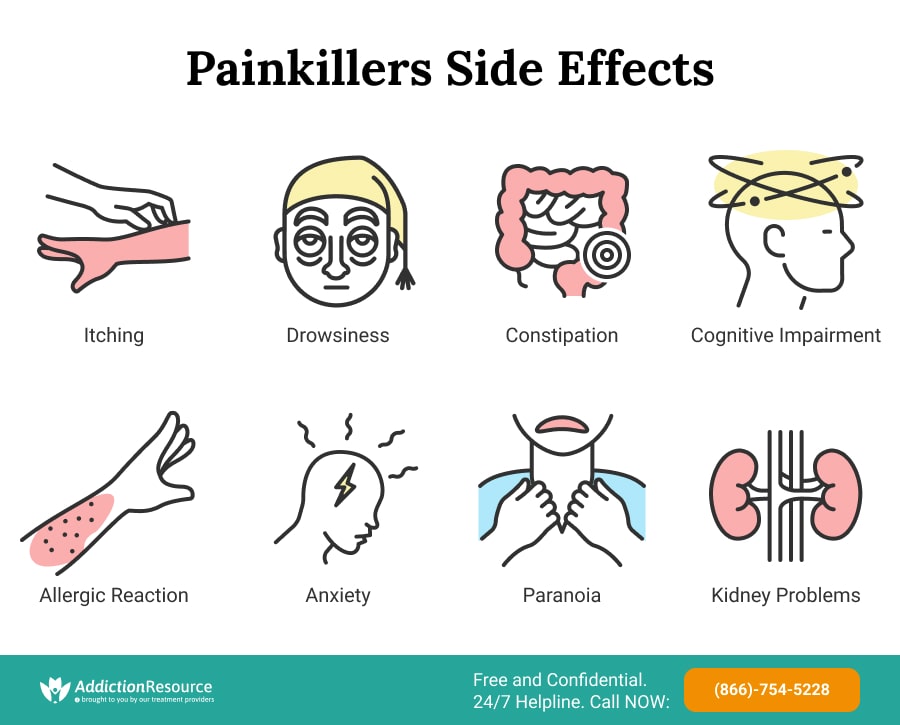There are lots of different pain medications available, and the side effects of painkillers vary in each case. These effects can appear immediately after use, after an unspecified amount of time, or with long term use and abuse. When taking pain relief medication, side effects may also take different forms. Some are short term issues such as the problem of pain medication constipation, and others last longer and can cause long-term health issues.
Learn About Side Effects Of Painkillers:
These medication consequences can be a problem for abusers or for people who need to safeguard their health, such as during pregnancy. In these cases, there are safe painkillers during pregnancy that should be taken in place of more commonly used options.
The Short-term Side Effects of Painkillers
Different types of painkillers can have physical and psychological short-term effects on the body with general use or when they’re overused or abused. This applies no matter what form the drugs are taken in, including when people try snorting painkillers. The effects can vary depending on the type of drug, but there are some that are commonly associated with most pain meds including opioid painkillers.
Taking pain medication in any way that is not prescribed by the medical specialist may lead to health damage and overdose.
Physical Side Effects
The exact effects that people experience from these medicines will vary depending on individual tolerances. However, there are some dangers of painkillers which are more common than others, including:
- Constipation due to pain meds
- Nausea
- Itching
- Drowsiness
- Allergic reaction to painkillers
- Cognitive impairment
- Overdose
These are serious concerns when taking illegal painkillers or prescription drugs.
Constipation from pain meds is one of the most common side effects, which is why the problem of how to relieve constipation due to pain medication is a major concern for people who take these medicines.
Overdose is one of the biggest dangers, which is why it’s important to know what happens when one overdoses on painkillers exactly.
Psychological Side Effects
Aside from the physical painkillers side effects, there are also some common psychological effects. These can be even more serious than nausea from painkillers and other short-term physical side effects. They can include:
- Depression
- Anxiety
- Paranoia
- Disorientation
- Anger or hostility
- Confusion
- Distorted perception
These side effects can be even worse when these drugs are mixed with other substances. For instance, the health and social problems caused after taking pain medication and alcohol together.
Long-term Side Effects of Painkillers
Some specific long term effects of painkillers can be clear signs of their prolonged use as well as signs of addiction to painkillers. The longer joint pain medications, nerve pain, or other pain med types are taken, the more likely there will be severe long-term effects. Some of the long-term physical and psychological issues are:
- Sleeping difficulties
- Gastrointestinal problems (bleeding or ulcers)
- Increased depression and anxiety
- Fluid retention
- Kidney problems
- Liver problems
- High blood pressure
- Immune suppression
- Tolerance to the drug
- Accidental overdose
- Addiction
- Death
Long-term side effects are even more common if analgesics are taken in conjunction with other medications. Analgesics taken with prescription drugs can be very dangerous, as proved by the problems experienced by people who mix Adderall and painkillers.
Avoiding Pain Medication Side Effects
Side effects from pain medications is a problem with not only the people addicted to them but with people who have severe or chronic health concerns. In these cases, it can be challenging to balance problematic health conditions like a liver disease with the need to diminish discomfort, which is why people need to focus on specific side effects and how to avoid them.
- What is pain medication safe for the liver? It depends on factors such as an individual’s tolerance for medicines and their physical condition. Everyone has a different tolerance for medicines. However, symptoms of liver damage from painkillers are common in people who take the drug at doses more than recommended. That is why it is important to stay within the recommended dose at all times and to ask a doctor about pain medication that does not affect the liver. At low doses, paracetamol is a pain medication safe for liver disease, but the usage of this medicine should still be discussed with a doctor because it can cause liver damage when abused.
- Certain studies have found a link between painkillers and heart attacks. Some analgesics damage heart health by increasing blood pressure and counteracting certain heart medications. So, what pain medication is safe for heart patients? The most reliable choices are painkillers that do not raise blood pressure, which eliminates certain medicines like NSAIDs. Do painkillers thin the blood? Yes, some of them such as aspirin does, and this is also an issue that needs to be raised with a doctor.
- Certain pain meds cause constipation on an ongoing basis. Additionally, constipation from pain meds after surgery is also very common. The best way to solve the problem of pain medication and constipation is by dietary measures. Increasing dietary fiber and water may help the problem to resolve naturally. However, sometimes the issue of pain meds and constipation isn’t resolved so simply, and a drug change may be required.
- Why do painkillers make one itch? This is usually because the drug interacts with the nervous system and triggers itch receptors. There are some simple solutions when people are wondering how to stop itching from painkillers including good skin hygiene, frequent moisturizing, anti-allergy medicine, showering or bathing, or trying other drugs that don’t cause the same reaction.
- Do painkillers make one sleepy? Yes, some of them can. However, there are some non-drowsy pain medication options available, including Aspirin, Ibuprofen, and Acetaminophen.
The best way to avoid all of the problems associated with pain medications is by limiting their use, though this may not always eliminate side effects. Limiting painkiller use can also be very difficult with certain chronic conditions that cause a lot of ongoing pain.
However, some analgesics such as opioids aren’t as effective with chronic conditions and can cause severe side effects. So people who use them on an ongoing basis should find trained medical professionals to find more effective options.
In many cases, finding natural alternatives or replacing the medication taken with analog can help. Just ask a doctor to prescribe nerve pain medication with the least side effects if any appears.
The Need For Timely Treatment of Side-Effects From Pain Meds
When people buy painkillers online or in person, they are often unaware of the side effects of pain medication. Overusing or abusing these medications can result in constipation, dangerous sedation, cognitive impairment, accidental overdose, physical and psychological addiction. Anyone who has experienced side effects must seek out expert advice and treatment immediately to avoid future health concerns, but do not stop their use on their own. There is also the option of trying natural pain medication, which may have fewer consequences.
Only a trained medical professional must identify any appropriate natural alternatives, as self-medication can be dangerous because of possible allergic reactions and other side effects.
Despite the potential short- and long-term effects of painkillers on the body, many people continue to overuse them. The overuse is made possible partly because people have the experience to know how to find a doctor to prescribe pain meds for recreational purposes.
Abusing painkillers with non-medical intent may cause health damage, or even severe consequences, such as overdose and death.
Side effects from painkillers are widespread with addiction, which is a severe problem that’s getting worse. People who struggle with the issue will need the help of drug addiction programs to ensure a safe recovery. There are many drug rehabilitation facilities available that can help people achieve the goal of eliminating painkiller abuse.
Page Sources
- Cardiovascular side effects of NSAID painkillers. Harvard Health Publishing. Harvard Medical School Publication. 2006. https://www.health.harvard.edu/press_releases/nsaid-side-effects
- Adverse effects due to long term opioids. Fact sheet, Health Professional Information. Government of South Australia.
More About Painkillers:

 Authored by
Authored by  Reviewed by
Reviewed by 



